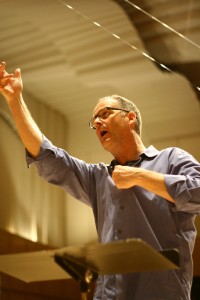UTAH CHAMBER ARTISTS, Libby Gardner Concert Hall, Feb. 25
Barlow Bradford obviously likes to experiment with programming. Otherwise, how would he come up with a concert that combines works by an early 19th century German composer with pieces by three contemporary Americans? That’s what he did for Monday’s Utah Chamber Artists concert – and it worked.
At first glance it might not seem there is a common thread between the music of Felix Mendelssohn and 20th/21st century American composers. But there certainly is a connection. The concert clearly showcased the choir side of UCA and spotlighted the immaculate vocal artistry of Bradford’s select group of singers.
The three contemporary pieces, by composers who are Minnesota natives, were for a cappella choir, and the ensemble was able to show off its talents, singing with pure intonation, a beautifully rounded and full sound and crisp articulation.
This set opened with Stephen Paulus’ “Pilgrims’ Hymn” from his opera The Three Hermits. Bradford brought a lot of feeling and emotion to his interpretation, and the choir sang with richly textured lyricism.
Abbie Betinis’ “Envoi,” from her Songs of Smaller Creatures, followed. It’s an evocative piece that uses a number of effects to create an imaginative sound world.
Timothy Takach’s “As the Sunflower Turns on Her God,” the final of the three, is a gorgeously expressive piece that was sung with feeling and wonderful expressiveness. Soprano Melinda Kirigin-Voss sang her solos with crystalline articulation and seamless lyricism.
These selections were flanked by music by Mendelssohn.
The concert opened and closed with two sacred works: Psalm 115, Non nobis, Domine, and Psalm 114, Da Israel aus Ägypten zog.
The former is clearly inspired by J.S. Bach in its harmonic language and in the writing for the voices and orchestra. The choir sang with conviction and vibrant energy. The three soloists – soprano Melissa Andres-Dawson; tenor Brian Stucki; baritone Michael Chipman – sounded wonderful together. They sang with seamless lyricism and resonant clarity. The orchestra, made up of a number of Utah Symphony members, played forcefully, and Bradford brought a vibrancy to the performance that made it dynamic.
Psalm 114 is a much more mature work in which Mendelssohn’s voice is distinctly heard. The harmonic and melodic writing is romantic and filled with fluid expressiveness. Scored for a double chorus, Bradford had his University of Utah Chamber Choir join UCA. The two choirs blended well together and thanks to Bradford’s perceptive interpretation, they brought a lushness to the music without overdoing it.
Rounding out the evening was a colorful account of Mendelssohn’s Hebrides Overture. Choosing good tempos, Bradford’s interpretation was ebullient yet tempered with finely crafted lyricism. The orchestra played with crisp articulation and execution.

